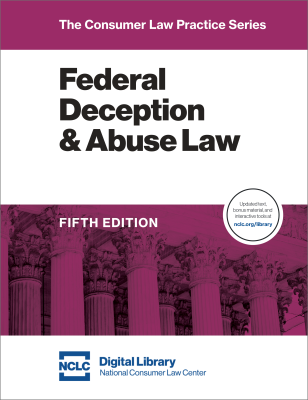Overview
The Supreme Court on July 6, 2020, in Barr et al. v. American Political Consultants, 2020 WL 3633780 (U.S. July 6, 2020), upheld the constitutionality of a key provision of the Telephone Consumer Protection Act (TCPA) that prohibits autodialed or prerecorded calls (robocalls) to cell phones without the called party’s consent. The decision has widespread implications for the TCPA’s continuing viability to limit the torrent of unwanted robocalls to consumers’ cell phones and to provide consumers some monetary relief for those calls. The ruling restores protections for robocalls relating to student loans and other government debts and also offers support for consumers litigating other TCPA issues in the courts.
Americans today receive billions of unwanted phone calls that too often violate the TCPA. The TCPA offers consumers $500 for each illegal robocall. The result has been an amazing number of federal court TCPA decisions as robocallers put forth every possible argument not to have to comply with the Act’s restrictions. A comprehensive analysis of the hundreds of TCPA rulings each year is found in NCLC’s Federal Deception Law Chapter 6.
This article focuses on the ruling in Barr and its implications. The article also briefly considers Barr’s implications for free speech challenges to other consumer protection statutes.
The Supreme Court Decision
In Barr, a group of robocallers challenged the TCPA’s constitutionality based on the presence of a 2015 amendment exempting calls made to collect government debt from the TCPA’s restrictions on robocalls. The challengers argued that the exemption was a content-based restriction that favored one type of speech over another and one group of speakers over another group, so it violated the First Amendment. The robocallers argued that, because this exemption was unconstitutional, the Court should strike down the TCPA’s restrictions on robocalls in their entirety.
A majority of the Supreme Court agreed that the exemption for calls to collect government debt unconstitutionally favored one form of speech content over another. But the Court, instead of striking down the whole restriction on robocalls, struck down the exemption for calls to collect government debt. This means that robocalls to collect government debt must comply with the same restrictions as all other robocalls.
The Justices issued four separate opinions, none of which commanded a majority. Six Justices—all but Breyer, Ginsburg, and Kagan—agreed that the exemption for government debt is a content-based restriction on speech that violates the First Amendment, although they disagreed on whether the standard was strict or intermediate scrutiny. A different constellation of seven Justices (all but Alito and Thomas) agreed that the government debt amendment should be severed from the rest of the TCPA, leaving the remainder of the statute intact.
TCPA Now Restricts Robocalls Relating to Student Loan and Other Government Debt; Effect on Earlier Calls and Cases
The Supreme Court severed the offending provision exempting calls relating to government debt from TCPA restrictions. As a result, the TCPA limits on robocalls remain in place not only for all other calls, but also for robocalls relating to government debt. The question remains, though, whether robocalls to collect government debt that were made without the called party’s consent before the Supreme Court’s decision are now actionable.
The TCPA statute of limitations is generally considered to be four years. See NCLC’s Federal Deception Law § 6.11.6. In theory, this means that any such robocall made within the past four years is now actionable. In addition, if the government debt exemption is unconstitutional, it should no longer stand as an obstacle in any pending or new cases.
However, in a footnote in the part of his opinion that was joined by the Chief Justice and Justice Alito, Justice Kavanaugh stated that “no one should be penalized or held liable for making robocalls to collect government debt after the effective date of the 2015 government-debt exception and before the entry of final judgment by the District Court on remand in this case, or such date that the lower courts determine is appropriate.” 2020 WL 3633780, at *13 n.12. Not only is this statement dicta, but it cites no rationale or supporting authority, and Justice Gorsuch’s separate opinion questions the Court’s authority to make this determination. Id. at *22. Nonetheless, any statement by three Supreme Court justices is likely to influence the lower courts.
Assuming that a lower court chooses to follow Justice Kavanaugh’s dicta, what does it mean? The reference to “such date that the lower courts determine is appropriate” appears to leave lower courts a great deal of discretion. A court might conclude that a caller proceeded at its own peril once it was on notice of challenges to the constitutionality of the exemption. Courts began issuing decisions on this issue as early as January 27, 2017. See Brickman v. Facebook, Inc., 230 F. Supp. 3d 1036 (N.D. Cal. 2017). So, it is clear that the constitutionality of the exemption was being challenged very soon after it was enacted. See NCLC’s Federal Deception Law § 6.3.5.1.
In addition, callers were on notice at least as of August 11, 2016, that there were serious questions as to whether the exemption had even gone into effect. On that date, the FCC announced its proposed rules to implement the government debt exemption and stated that the exemption would not go into effect until the rules were finalized (which they never were). See NCLC’s Federal Deception Law § 6.3.5.1a. Court rulings in 2017 and 2018 were divided as to whether the exemption had gone into effect, but at the very least callers collecting government debt knew as of mid-2016 of the flaws in their theory that the exemption allowed them to ignore the TCPA’s requirements.
Regardless of the answers to these questions, some robocalls made by government debt collectors never qualified for the exemption in the first place. For example, if a call was made to collect a private student loan debt, or both a private and a government student loan debt, then the government debt exemption was never applicable. The government debt exemption for robocalls to cell phones was written to apply only if the call was made “solely to collect a debt owed to or guaranteed by the United States.” 42 U.S.C. § 227(b)(1)(A)(iii). If the call was made to the wrong person—for example, to a person with a name similar to the debtor but who was not the debtor—it may also be possible to argue that it was not a call to collect a government debt. See NCLC’s Federal Deception Law § 6.3.5.3.
Implications of Supreme Court Ruling for Future TCPA Decisions
The constitutionality of the TCPA restrictions on robocallers is only one of many TCPA litigation issues. New court decisions are being issued almost on a daily basis. The ruling in Barr cannot but help consumers in that litigation.
Strong language from Justice Kavanaugh recognizing the importance of the TCPA’s protections against robocalls will be useful to cite in almost every brief and oral argument regarding the TCPA. The Justice wrote:
Americans passionately disagree about many things. But they are largely united in their disdain for robocalls. The Federal Government receives a staggering number of complaints about robocalls—3.7 million complaints in 2019 alone. The States likewise field a constant barrage of complaints. For nearly 30 years, the people’s representatives in Congress have been fighting back. [Barr, 2020 WL 3633780, at *2.]
Justice Kavanaugh also referred to the “torrent of vociferous consumer complaints about intrusive robocalls” that prompted the passage of the TCPA, and quoted Senator Hollings’ famous description of robocalls as “the scourge of modern civilization. They wake us up in the morning; they interrupt our dinner at night; they force the sick and elderly out of bed; they hound us until we want to rip the telephone right out of the wall.” Id. (citing 137 Cong. Rec. 30821 (1991)). Justice Kavanaugh referred to the harm that would be suffered by “the tens of millions of consumers who would be bombarded every day with nonstop robocalls notwithstanding Congress’s clear prohibition of those robocalls” if the TCPA were struck down. Id. at *13.
Does the decision provide indirect support for a broad definition of autodialer? A raging issue regarding the interpretation of the TCPA prohibition at issue in Barr is the interpretation of the statutory definition of “automatic telephone dialing system.” In particular, courts have disagreed about whether it should be interpreted to include predictive dialers like those used to collect debts, which dial numbers from a list fed into the system rather than by generating random or sequential numbers. See NCLC’s Federal Deception Law § 6.3.2.
None of the Barr opinions address this question directly, but all of them assume that the calls made pursuant to the government debt exemption are subject to the TCPA. Obviously, autodialed calls made to collect debts owed to the government are made from a list of debtors, not from a list of randomly generated telephone numbers.
Barr’s Implications for First Amendment Challenges to Other Consumer Statutes
Many consumer protection statutes restrict or require speech in some way, and they generally apply the restriction to a particular category of speech—food labels, SEC filings, loan disclosures, debt collection harassment. Does the Court’s ruling that the government debt exemption is an unconstitutional content-based restriction on speech throw these other laws into jeopardy?
Most of the Justices appear to agree that the answer is no, but they differ as to the test that should be applied. Justice Kavanaugh’s opinion (joined by three other Justices) discusses the application of the First Amendment to the federal Fair Debt Collection Practices Act:
[A]ccording to the Government, if [the government debt exemption] is content-based because it singles out debt-collection speech, then so are statutes that regulate debt collection, like the Fair Debt Collection Practices Act. . . . That slippery-slope argument is unpersuasive in this case. As we explained in Sorrell, “the First Amendment does not prevent restrictions directed at commerce or conduct from imposing incidental burdens on speech.” 564 U.S., at 567. The law here, like the Vermont law in Sorrell, “does not simply have an effect on speech, but is directed at certain content and is aimed at particular speakers.” Ibid. . . . Our decision is not intended to expand existing First Amendment doctrine or to otherwise affect traditional or ordinary economic regulation of commercial activity.
[Id. at *6.]
Justice Breyer, in an opinion joined by Justices Ginsburg and Kagan, argued against applying strict scrutiny mechanically to all content-based distinctions, and particularly not to “traditional or ordinary economic regulation of commercial activity that imposes incidental burdens on speech.” Id. at *18. These Justices would not have struck down the government debt exemption at all. A special concurrence by Justice Sotomayor indicates that she agrees with much of Justice Breyer’s approach.
First Amendment law as it applies to consumer statutes is far from clear. An overview of the case law is found in NCLC’s Unfair and Deceptive Acts and Practices § 11.9.2.


